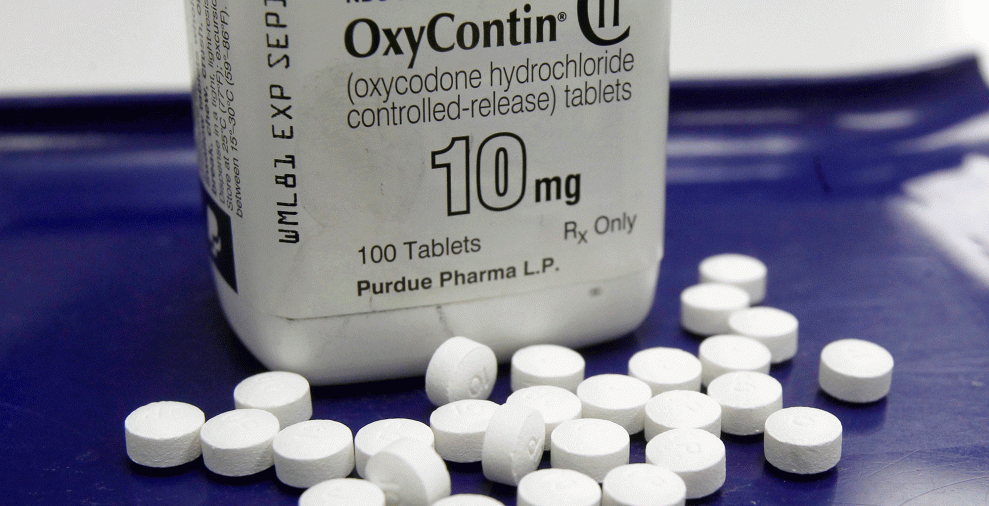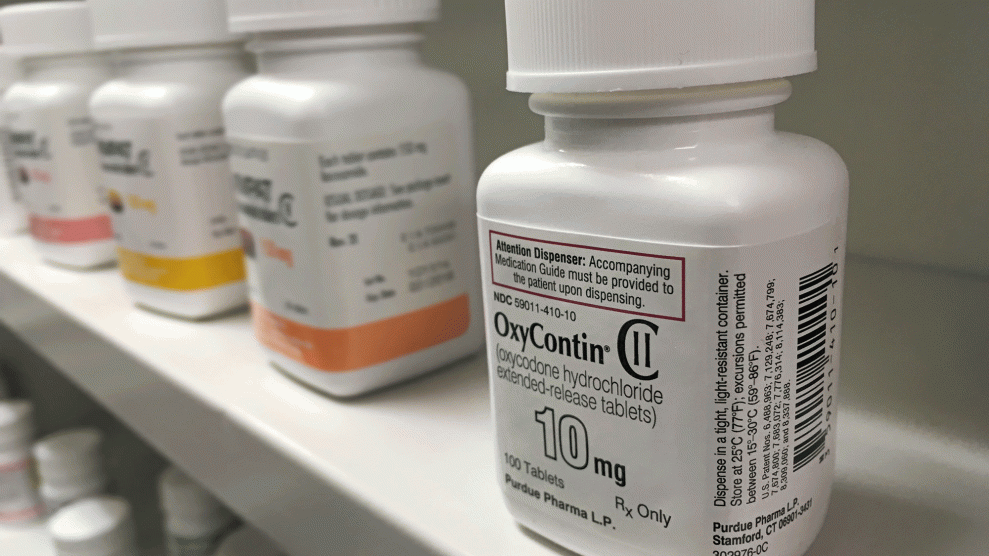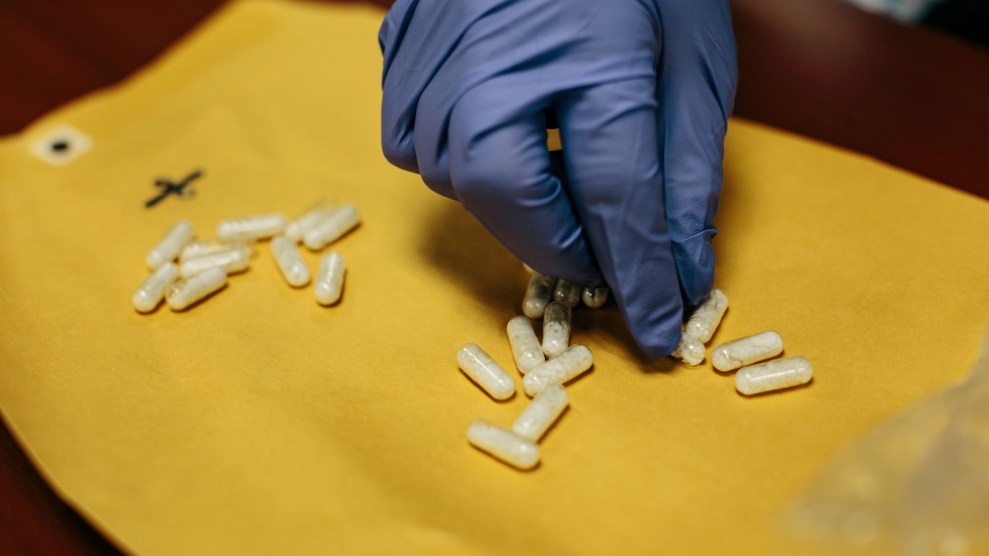
Toby Talbot/AP
For years, McKinsey & Company allegedly consulted for Purdue Pharma, the maker of the opioid OxyContin, on how to boost painkiller sales and counter bad PR—namely, “the emotional messages from mothers with teenagers that overdosed.”
The relationship was revealed in a new explosive article by ProPublica’s David Armstrong based on Massachusetts’ 274-page complaint against Purdue and its executives. The 2018 lawsuit alleges that the pharmaceutical company planted the seeds for today’s opioid epidemic with overzealous and misleading promotion of the addictive drugs.
While the complaint was made public earlier this month, some passages were redacted at Purdue’s request. Armstrong managed to review the redacted paragraphs and found several troubling new allegations. First, in addition to selling OxyContin, Purdue explored moving into the addiction treatment market. “It’s an attractive market,” wrote a Purdue team in a presentation, according to Armstrong. “Large unmet need for vulnerable, underserved and stigmatized patient population suffering from substance abuse, dependence and addiction.”
He also uncovered details of the role of global consulting behemoth McKinsey in boosting OxyContin sales:
From 2009 until at least 2014, McKinsey helped Purdue shape its message for selling OxyContin and overcoming concerns about addiction and overdoses, according to redacted passages. The consultant told Purdue in a slide presentation that it could increase prescriptions by convincing doctors that opioids provide “freedom” and “peace of mind” and give patients “the best possible chance to live a full and active life.”
Purdue staff, according to the complaint, told the Sacklers [Purdue’s founders] that McKinsey would study “patient pushback” to encourage hesitant doctors to prescribe opioids. In a meeting with Purdue executives, McKinsey planned how to “counter the emotional messages from mothers with teenagers that overdosed in [sic] OxyContin” by recruiting pain patients to talk about the need for the drugs.
In a 2013 report, McKinsey recommended directing sales representatives to focus on the most prolific opioid prescribers because that group writes “25 times as many OxyContin scripts” as less prolific prescribers. Because prescription rates rose in tandem with visits from sales reps to doctors, McKinsey recommended increasing each salesperson’s quota from 1,400 visits a year to closer to 1,700. McKinsey estimated that targeting the most frequent prescribers could boost OxyContin sales by hundreds of millions of dollars. The quotas rose, as did total visits, the complaint states. Purdue said it planned to decrease visits relating to opioid products, and any increase was due to promoting a laxative.
This appears to be the first time that the details of McKinsey’s relationship with Purdue have been made public—work that stands in stark contrast with the firm’s publicized efforts to curb the opioid epidemic. McKinsey’s website touts that its Opioids Insights team “generates data-driven insights,” provides expertise, and implements technology to help clients and society at large combat the crisis. “The opioid crisis remains one of the United States’ most alarming and daunting public health problems,” the Opioids Insights website reads. “Combatting the crisis is far from easy.” Based on data from state Medicaid programs, the team concluded that “opioid prescribing is widespread” and doesn’t result from “outlier prescribers.” Rather, it went on, prescription rates vary dramatically by geography and even within an individual prescriber’s practice.
“I start today by asking, why do we continue to prescribe, dispense, pay for opioid prescriptions in people that we know…have an incredibly high propensity to abuse them?” says a McKinsey partner on the Opioids Insights team in a presentation titled “Combatting the Opioids Crisis: If Not Us, Who?”
Asked about the apparent dichotomy between its public statements and alleged work with Purdue, a McKinsey spokesman tells Mother Jones it has “not been provided the unredacted lawsuit” and could not comment.
While the new revelations come from a Massachusetts lawsuit, the state is hardly alone in trying to hold Purdue responsible: As the opioid epidemic continues to flourish, a number of municipalities and states have sued Purdue, the first pharmaceutical company to aggressively market the painkillers. The stinging complaints allege a strategic effort to sell prescriptions at all costs. As Mother Jones has previously reported, Purdue’s strategy for selling opioids was summed up with the tagline “We sell hope in a bottle,” according to allegations in a Tennessee lawsuit from last year. The suit includes notes that sales reps took during training, revealing how the marketers were taught to “follow the money,” “never give someone more info than they need to act,” “expand the physician’s definition of ‘appropriate patient,'” and “ABC”—”Always Be Closing,” a reference to the movie Glengarry Glen Ross, about a real estate salesman who uses deceptive tactics to sell properties at inflated prices.
In a similar lawsuit filed in Montana, former Purdue sales representative Sean Thatcher gave a strikingly open testimonial: “Purdue ranked the doctors I visited based on prescription data the company regularly purchased from a commercial source,” said Thatcher, who worked for Purdue between 2009 and 2015. “‘High decile’ prescribers were those who prescribed more of Purdue’s drugs or, because of their prescribing of other opioids, were potentially high prescribers. They were priority targets for the sales team.”
Purdue has repeatedly pointed out that OxyContin was approved by the Food and Drug Administration and noted that today’s overdoses are primarily caused by illicit drugs like heroin and fentanyl. In a statement to Armstrong about the redacted material in the Massachusetts case, Purdue said that the state “seeks to publicly vilify Purdue, its executives, employees and directors by taking out of context snippets from tens of millions of documents and grossly distorting their meaning. The complaint is riddled with demonstrably inaccurate allegations.”













